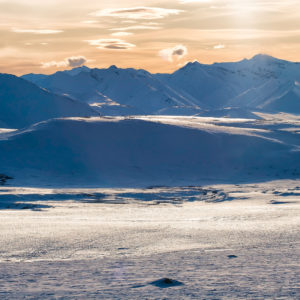Oil extraction in Alaska has been a subject of controversy for decades. While proponents argue that it will enhance the country’s energy security and create jobs, environmentalists are concerned about its potential impact.
The project began in the 1960s and involved drilling in the Arctic National Wildlife Refuge (ANWR) in northeast Alaska. ANWR is a 19.6 million-acre region that is home to a diverse range of wildlife, including caribou, polar bears and migratory birds. The region is also significant for its cultural and spiritual importance to the Gwich’in people, who have lived there for thousands of years.
Environmentalists argue that the oil-drilling project will cause significant harm to ANWR’s delicate ecosystem. The drilling process involves using heavy machinery and drilling rigs that could damage the fragile tundra. The tundra is home to several plant species, including lichens and mosses that are crucial for soil stability and carbon sequestration. The drilling process could also lead to releasing of greenhouse gases and contaminating of soil and water resources, potentially harming wildlife and human health.
Oil spills and leaks could potentially harm these native species and cause long-term damage to their habitat. Additionally, they could disrupt the caribou’s migratory patterns, significantly affecting the Gwich’in, who rely on caribou for their subsistence and cultural practices.
These concerns have been amplified in recent years because of climate change. The Arctic is one of the regions most affected by climate change, with temperatures rising twice as fast as the global average. The melting of sea ice has opened up new opportunities for oil drilling, but it has also increased the risk of oil spills and leaks. Moreover, the extraction and burning of fossil fuels contribute significantly to greenhouse gas emissions, exacerbating climate change.
The project also raises questions about the country’s energy policy and commitment to transitioning to cleaner energy sources. The United States is one of the largest oil consumers, with more than 90 percent of its transportation fueled by petroleum products. While the country has made progress in increasing the use of renewable energy sources, its dependence on oil remains a significant challenge. The Alaskan project highlights the need for a comprehensive and sustainable energy policy that balances energy needs with environmental obligations.
Despite the concerns of environmentalists, the project has received support from some politicians and industry groups. Supporters argue that the project will enhance the country’s energy security by reducing its dependence on foreign oil and will create jobs. They also point out that the project will generate significant revenue for the government, which could be used for infrastructure development and other public projects.
Alaskan authorities have generally supported oil exploration in the Arctic. They argue that oil exploration and drilling would benefit the state. However, not all Alaskan authorities support oil exploration in the area.
Alaska Native communities, particularly those that rely on subsistence hunting and fishing, have expressed concerns about the potential effect of oil exploration and drilling on their way of life. They argue that the project would disrupt the region’s ecological balance and harm the wildlife they depend on for their subsistence.
Moreover, the Alaskan authorities’ stances on oil exploration are one of many factors that determine whether the project moves forward. The Bureau of Land Management regulates oil exploration and drilling in Alaska. The decision-making process involves evaluating the project’s potential environmental effects and economic benefits.
The contentious project highlights the tension between energy needs and environmental obligations. As the world faces the challenges of climate change and the need for a sustainable energy policy, it is essential to consider the long-term consequences of oil extraction projects and prioritize protecting our planet’s natural resources.

